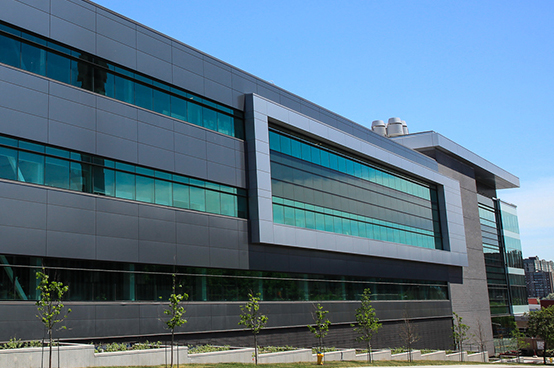
The Centre for Research in Photonics—Advanced Research Complex (ARC) at the University of Ottawa
(© Ottawa University)
In September 2014, the University of Ottawa officially opened the Centre for Research in Photonics—Advanced Research Complex (ARC). The 14,000-square-foot, state-of-the-art, open concept, research-only building is designed to integrate students and researchers from across Canada and the world to foster greater scientific exchange and innovation in geosciences and photonics.
The ARC building is the home of an accelerator mass spectrometer, the only one of its kind in Canada. It also houses 10 vibration-resistant laboratories specially designed for sensitive laser experiments. The $70 million building was funded by the Canada Foundation for Innovation, the Ontario Research Fund and the University of Ottawa.
The Research Support Fund, granted and administered by the Tri-agency Institutional Programs Secretariat, contributes to the maintenance of this new infrastructure by covering expenses incurred from operating costs, such as electricity and security. As one of the top 10 research-intensive universities in Canada, the University of Ottawa says that the quality of the physical environment is a critical factor for the recruitment and retention of researchers and students, and contributes significantly to the student experience.
The infrastructure funded, and the kind of research it will generate, will not only increase international collaborations, but, say University of Ottawa representatives, revolutionize the world we live in and enhance the quality of life of Canadians. Photonics is set to witness advancements in such areas as medical diagnostics—resulting in earlier detection of disease—personalized medicine, tissue-engineering, renewable energy sources, and new materials. Research in geosciences will help us better detect contaminants in our bodies and in our environment, and help the Canadian government improve environmental policies.
The Research Support Fund supports a portion of the costs associated with managing the research funded by the Canadian Institutes of Health Research, Natural Sciences and Engineering Research Council, and Social Sciences and Humanities Research Council, such as salaries for staff who provide administration support, training costs for workplace health and safety, maintenance of libraries and laboratories, and administrative costs associated with obtaining patents for inventions.